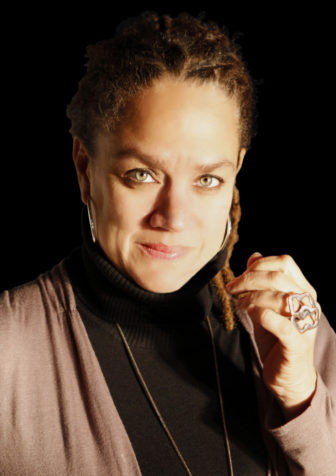Jacquie Jones, former executive director of Black Public Media, dies at 52

Black Public Media
Jones
Longtime public media leader and filmmaker Jacquie Jones died Sunday in Washington, D.C., from cancer. She was 52.
Jones had been living in Durban, South Africa, and traveled to Washington, D.C., over the holidays when she became ill, according to friend and colleague Mable Haddock.
From 2005–14 Jones was executive director of Black Public Media, then called the National Black Programming Consortium. She received two Peabody Awards for her documentary and television work.
Friends and colleagues remember Jones as a devoted mother and wife and an advocate for living up to public media’s ideals for reaching underserved audiences.
Jones was strong-willed, determined, “positively black, positively stands for human rights, women’s rights, all rights,” said Haddock, who founded NBPC and recommended Jones to succeed her as the organization’s executive director. “She fought for these things for public TV and public media and everywhere else she went.”
“If anybody could handle that tough job, it would be Jacquie,” Haddock said.
Jones and Haddock, whose friendship spanned 30 years, once traveled together to South Africa for a global festival that draws filmmakers devoted to social issues for a week of viewings, discussions, workshops and parties, Haddock said. Jones met a South African man and told Haddock that he was going to be Jones’ husband. “No he’s not,” Haddock told her. Jones proved Haddock wrong and relocated to South Africa.
Haddock tapped Jones to lead BPM in 2005. “I stole her back from South Africa,” Haddock said.
Within a year at BPM, Jones changed the direction and personality of the organization, “and all to the good,” Haddock said. BPM shifted from focusing mainly on storytelling around historic and cultural issues to sharing its content on new platforms and training black and other minority producers, Haddock said. Jones founded the New Media Institute, a media training program, in 2006 and the Public Media Corps in 2009.
“Words cannot express how deeply saddened we are. In the field, Jacquie was our fiercest advocate, encouraging all of us — media makers, administrators, leaders — to take risks, and to fully explore what public media can be for a diverse America,” said Leslie Fields-Cruz, Jones’ successor at Black Public Media, in a statement.
CPB President Pat Harrison credits Jones with presenting a nuanced portrait of high-school dropouts in NBPC’s 2013 documentary 180 Days: A Year Inside an American High School. Filmed in Washington, D.C., and produced for PBS, the documentary was part of CPB’s American Graduate initiative. It showed the full and complex lives of young people who were working, homeless or taking care of young siblings while trying to study, Harrison said.
The film won a Peabody Award, and Jones applied the same formula in 2015 to 180 Days: Hartsville, co-produced by Black Public Media and South Carolina ETV.
“She was able to get people to talk to her immediately because she had understanding and compassion for the people she was filming,” Harrison said. “She wasn’t this detached filmmaker. You can see Jacquie in all her films.”
As CPB developed a strategic framework around the pillars of “diversity, digital and dialogue,” Jones understood that public media content would have to be on multiple platforms to connect with a rising generation, Harrison said.
“I was able to see these three Ds come to life in Jacquie’s works, so we talked about getting rid of that concept of outreach — as if you have information and you’re going to share it from on high with your audience — get rid of that and really engage so people are helping you shape what you want,” Harrison said.
Earlier in her career, Jones was a producer for WGBH in Boston and served as senior VP of Orlando Bagwell’s ROJA Productions, where her TV credits included Matters of Race and the Peabody Award–winning Africans in America. She went on to update existing media and create new installations for collections of the National Civil Rights Museum in Memphis, Tenn.
Jones was born April 28, 1965, in Washington, D.C., and grew up in Memphis, Tenn. In 1987, Jones graduated from Howard University with a bachelor’s degree in English. She received a master’s degree in documentary filmmaking from Stanford University in 1995.
Jones is survived by her husband, Grant Clark, and daughter Ayana. CPB will create a scholarship in Jones’ name for young women of color who are aspiring or working filmmakers, Harrison said. More details are expected to be announced at the PBS Annual Meeting in New Orleans in May.
Read about her memorial service here.
Correction: An earlier version of this article mistakenly said that Jacquie Jones was the first editor of the Black Film Review. She was the second editor. An earlier version also gave the incorrect month for the PBS Annual Meeting. It will be held in May, not March.






Jacquie Jones will be missed by many!
Awa!!! I am just seeing this, unfortunately … Jacquie was a colleague and friend and was a ‘full’ woman of the arts. A filmmaker, arts administrator, and poetic soul. She will be sorely missed. Condolences to her family.
JFJordan
My name is DJuna and I have been searching high and low trying to reconnect with Jacquie. She and I were childhood friends for a few years. I traveled to the Island with her. We spent the summer there with her cousins; Karen and Stephanie of New York. Her grandfather with the Priest there in Grand Turk. This is a very sad moment for me to finally find her this way. A friend from the Island said that he had heard about one of the grand children passing away but wasn’t sure. I advised him that I had been trying for years to contact them but without any luck. Karen and I had reconnected when I was living in New York and then she and I had lost contact. I’m sending my deepest prayers to the entire family.
Love DJuna Collier-McClung
I happened to check the BPM website and saw a memorial scholarship in her name. Our paths crossed a few times when I was a reporter covering public media. She was so accomplished. Rest in peace.